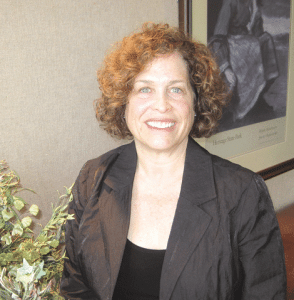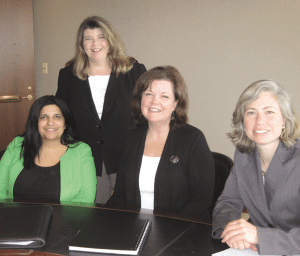The Power of Peers
WPO Provides a Unique Support System for Women in Business

Cathy Crosky says WPO helps second-stage companies — those with more than 10 employees and $1 million in annual revenues — address their specific needs.
That’s one of the many descriptive words and phrases that she and other members applied to the Women Presidents Organization, or WPO, and its Springfield chapter. And they hint broadly at a specific, and distinctive, form of support provided to those who have found it.
Created for women who own or manage what are known as second-stage companies — those with more than 10 employees and $1 million in annual revenues — or direct large nonprofit agencies, WPO is unique in that regard, and also in the way it helps members address their specific problems and issues, said Wright, president of CSW Inc. in Ludlow.
She told BusinessWest that the monthly meetings put her in a room with successful individuals facing similar challenges — and possessing a common desire to help such peers. And this is just the environment she needs at this stage of her life and career.
“I’m in a male-dominated industry,” said Wright, whose company manufactures printing plates and cutting dies for the packaging industry and also offers brand-management services to consumer product companies. “But I found results-oriented women in the group who were focused on their businesses and very successful. And they’ve helped me grow my business.”
Meghan Sullivan concurred.
“It’s very refreshing to be in a room of people that have very similar experiences,” said Sullivan, managing partner of the Springfield-based law firm Sullivan Hayes & Quinn. “Whether it’s being a leader and shouldering that burden or balancing the obligations of work and the joys and obligations of family — we’re all going through the same kinds of things.”
Cathy Crosky, chair of the Springfield chapter of WPO, said the group now boasts 10 members (most chapters have no more than 20) who meet monthly for three hours. They represent a number of business sectors — from manufacturing to professional services to the nonprofit realm — but share common challenges inside and outside the workplace.
“Once you get your business over a million, it requires a different kind of leadership than when you started the business,” said Crosky, an executive coach and organizational transformation consultant with Charter Oak Consulting Group in Williamstown. “You need different things at a different stages, and women don’t have many role models or mothers that did what we do, but they still have the same challenges.”
The organization’s website announces that it provides “a professionally facilitated, non-judgmental forum for second-stage peers to bring the ‘genius out of the group,’ accelerate the growth of their businesses, and to promote the acceptance and advancement of women entrepreneurs in all industries.”
Translating, and elaborating, Crosky said the group makes extensive use of a roundtable process called Peerspectives, developed by the Edward Lowe Foundation (named after the entrepreneur who, among other things, gave the world cat litter) to drill down on an issue and help the individual presenting a dilemma or goal benefit from collective peer wisdom.
“We ask questions, and that requires the person who is looking for feedback to talk through their issue based on the questions,” she said, adding that the group doesn’t provide answers, but rather helps members forge their own. “So, rather than being told, ‘this is what you should do,’ there is a series of questions that brings problem solving to a deeper level — for them and for us.”
For this issue and its focus on women in business, we spoke with a number of members of the Springfield chapter of WPO to find out how this organization benefits its members, and why its roundtable format is successful in generating results for all those involved in the discussions.
Accountability Now
Shalu Arora, president of Skylightsys Strategic Staffing, an information-technology staffing agency in East Hartford, Conn., started her company eight years ago, and is known in entrepreneurial circles as a ‘gazelle’ because of the speed with which her company grew; she hit $1 million in sales in her second year.
And as a gazelle, she has different needs — and conversations — than those who are just getting a business off the ground. Being in a room full of people who understand her situation, mostly because they’ve been there themselves, is one of the biggest benefits from being a WPO member, she said.
“A startup doesn’t need any processes,” Arora told BusinessWest. “Second-stage business owners need the right advice in terms of legal, compliance, staff management, employee handbooks … the list goes on. You go from managing yourself and a few others to having a large group, and there’s a lot that goes with that.”

From left, Shalu Arora, Meghan Sullivan, Pattie Hallberg, and Laura Wright say WPO members are held accountable for taking the steps necessary to solve their issues.
Arora’s situation, and outlook, are typical of those who have joined the Springfield chapter, one of 105 around the world. Their individual stories vary, but their motivations for joining the organization are essentially the same: they want to grow their businesses or nonprofits, and they want to grow professionally.
And they’ve come to understand that the best way to do that is to be around people who understand what it takes to do both, and can, as the WPO website suggests, pull the collective genius out of the group.
People like Pattie Hallberg.
The CEO of the Girl Scouts of Central and Western Massachusetts, based in Holyoke, Hallberg is a member of WPO and also involved with the Longmeadow Business Group, which is comprised mostly of men, and said there really is no other women’s group that maintains the continual focus on education and business development that WPO does.
A year ago, Hallberg was looking for opportunities to explore different aspects of business and management, and WPO came into a conversation with a friend. She joined, and helps brings the nonprofit perspective into the group’s discussions, with the understanding that it’s the same perspective of those in business.
“There’s a place for nonprofit conversation that people may think is a little bit different than a business conversation, but there’s really not that much difference — we just have different products,” Hallberg said, adding that she’s intrigued by the breadth and depth of issues put on the table for discussion.
Some of them are strictly business- and bottom-line-oriented, she went on, while others involve the overriding assignment of balancing work and life — and finding a formula for succeeding at both.
Wright noted that many discussions involve how to take a business to the next level, and these conversations are multi-faceted, involving more than spread sheets, sales projections, and marketing strategies.
“Those are the most interesting conversations; it’s a great forum for making a change and making a business what you want it to be,” she explained. “And that all goes back to the members treating each other as the whole person, not just as a businessperson.”
Perhaps the one word that came up most often in commentary about WPO and how it benefits members was accountability. If women want to grow professionally and personally, they have to put plans in place and affect change where it’s needed, said Sullivan, adding that the group works diligently to keep members’ feet to the fire.
Indeed, if the previous month’s meeting spent a good deal of time on one of the member’s concerns, that member should expect to report what’s happened since in the very next meeting, said Sullivan, who, when asked how accountability is achieved, was quick to respond.
“They ask you,” she said, laughing. “They ask, ‘did you do it?’ And they ask why you did or didn’t do it; they put you right on the spot, and it forces you to face that you’re procrastinating, or it forces you to have a perspective that you didn’t have, but you should have had.”
In addition to the Peerspectives roundtable, there are other methods of learning through WPO, including articles and books, business-planning methods, self-assessment tools, and presenting and discussing various leadership topics, said Crosky. But the group has attended some retreats staged by the Edward Lowe Foundation, and a recent addition to the schedule is a new annual conference in Rhode Island with the WPO chapters from Boston and Rhode Island, which allows the Springfield chapter to expand its network and collectively learn from others facing similar challenges.
Tapping into Wisdom
Arora told BusinessWest that it’s hard to look at the bottom line and say her company’s continued growth is due to WPO, but she can state with confidence that it has definitely helped.
“If you help the leader, you help the company,” she said. “I’ve made bolder, better, and swifter decisions than before I was part of this group.”
Enabling its members to say such things is among the many goals of the WPO organization, which acts as a sounding board, as Wright described, or as a board of directors, as others have noted — or as a tough, yet compassionate, group of peers, which is perhaps the most accurate description.
And one can’t underestimate the power of peers.
Elizabeth Taras can be reached at [email protected]





